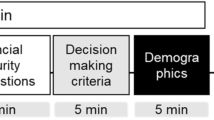Abstract
Management and non-management employees of a northeastern bank read a description of a manager who engaged in a breach of confidentiality. Subjects were asked to evaluate the acceptability of 27 excuses. Results showed that subjects' ratings of acceptability were affected by their individual perception of the severity of the stimulus manager's breach of confidentiality. Subjects' rank did not affect acceptability of accounts.
Similar content being viewed by others
References
Anderson, L. R. and Thacker, J.: 1985, ‘Self-monitoring and sex as related to assessment center ratings and job performance’, Basic and Applied Social Psychology 6, 345–361.
Barry, V.: 1983, Moral Issues in Business (Belmont, CA: Wadsworth).
Bass, B. M.: 1981, Stogdill's Handbook of Leadership (New York: Free Press).
Berger, J., Cohen, B. P., and Zelditch, M.: 1972, ‘Status characteristics and social interaction’, American Sociological Review 37, 241–255.
Brenner, S. N. and Molander, E. A.: 1977, ‘Is the ethics of business changing?’, Harvard Business Review (January–February), 64–68.
Giacalone, R. A. and Rosenfeld, P.: 1984, ‘The effect of perceived planning and propriety on the effectiveness of leadership accounts’, Social Behavior and Personality 12, 217–224.
Harvey, O. J.: 1953, ‘An experimental approach to the study of status relationships in informal groups’, American Sociological Review 18, 357–367.
Hogan, R.: 1970, ‘A dimension of moral judgements’, Journal of Consulting and Clinical Psychology 35, 205–212.
Jones, E. E. and Davis, K. E. 1965, ‘From acts to dispositions: The attribution process in person perception’, in L. Berkowitz (eds.), Advances in Experimental Social Psychology (Vol. 2) (New York: Academic).
Kipnis, D., Schmidt, S. M., Swaffin-Smith, C., and Wilkinson, I.: 1984, ‘Patterns of managerial influence: Shotgun managers, tacticians, and bystanders’, Organizational Dynamics (Winter), 58–67.
Meehan, K. A., Well, S. B., and Abbott, R. D.: 1979, ‘The role of dissimulation and social desirability in the measurement of moral reasoning’, Journal of Research in Personality 13, 25–38.
Newstrom, J. W. and Ruch, W. A.: 1976, ‘Managerial values underlying intraorganizational ethics’, Atlanta Economic Review (May–June), 10–16.
Pandey, J.: 1981, ‘Ingratiation tactics in India’, The Journal of Social Psychology 113, 147–148.
Riordan, C. A., Marlin, N. A., and Gidwani, C.: 1985, ‘Accounts offered for unethical research practices: Effects on the evaluations of acts and actors’, unpublished manuscript, University of Missouri-Rolla.
Rothman, M. L. and Gandossy, R. P.: 1982, ‘Sad tales: The accounts of white-collar defendants and the decision to sanction’, Pacific Sociological Review 25, 449–473.
Schleffler, I. and Winslow, C. N.: 1950, ‘Group position and attitude toward authority’, Journal of Social Psychology 32, 177–190.
Schneier, C. S.: 1977, ‘Performance appraisal: Does the use of multiple rater groups help or hinder the process?’, Public Personnel Management 6, 13–20.
Velasquez, M., Moberg, D. J., and Cavanaugh, G. F.: 1983, ‘Organizational statesmanship and dirty politics: Ethical guidelines for the organizational politician’, Organizational Dynamics (Autumn), 65–80.
Author information
Authors and Affiliations
Additional information
Robert A. Giacalone is Assistant Professor of Management at the University of Southwestern Louisiana. He has been given the Outstanding Young Men of America Award, 1985. One of his articles has been published in Group and Organization Studies (1985), another will be published in Basic and Applied Social Psychology.
Hinda Greyser Pollard is Associate Professor of Management at the Bryant College, Smithfield, RI. She has been awarded Phi Beta Kappa (1958) and Who's Who of American Women (1985–1986). She has written an article, together with Giacalone, which has been published in The Organizational Behavior Teaching Review (1985–1986).
Rights and permissions
About this article
Cite this article
Giacalone, R.A., Pollard, H.G. The efficacy of accounts for a breach of confidentiality by management. J Bus Ethics 6, 393–397 (1987). https://doi.org/10.1007/BF00382896
Issue Date:
DOI: https://doi.org/10.1007/BF00382896




